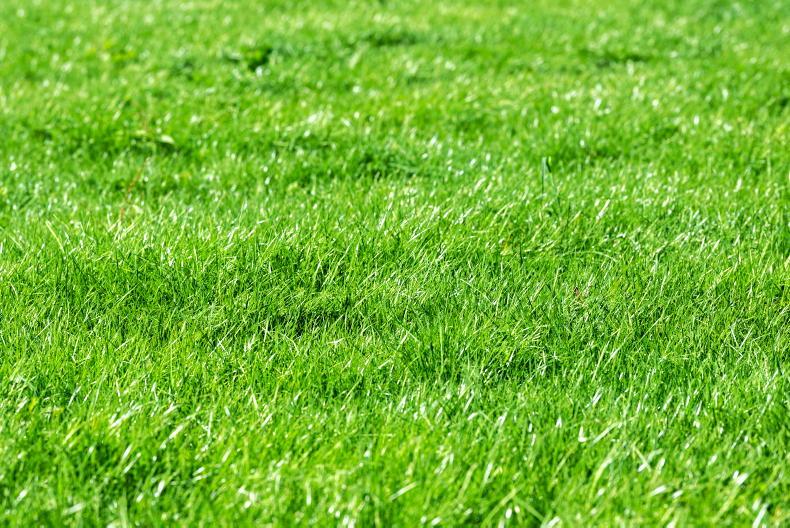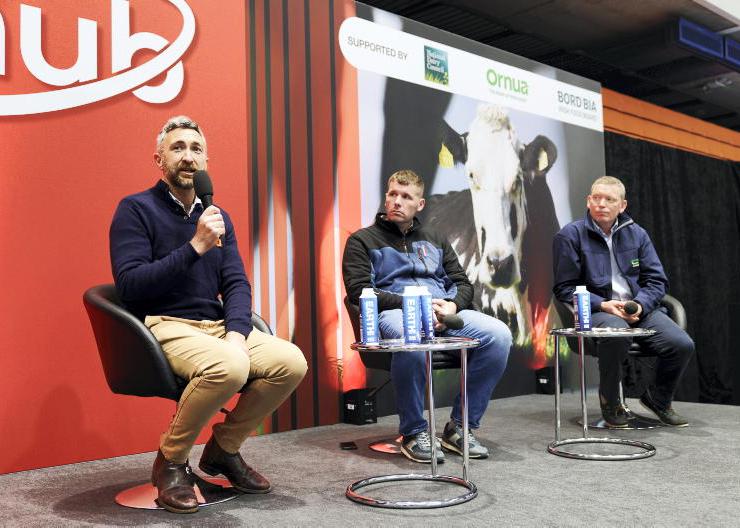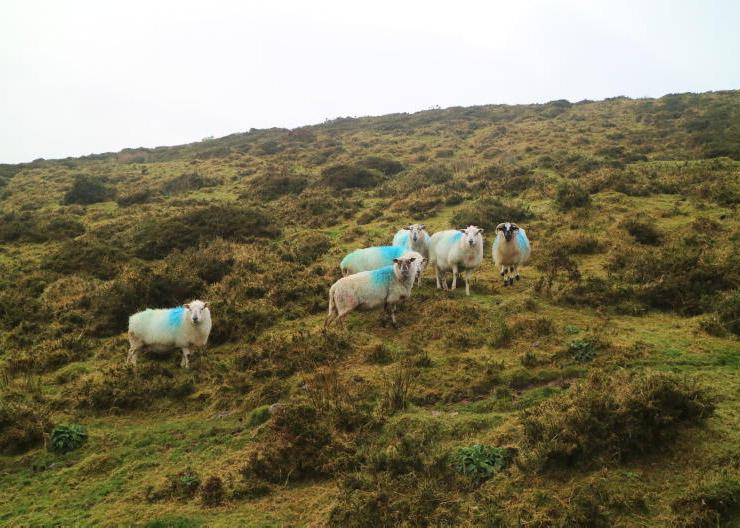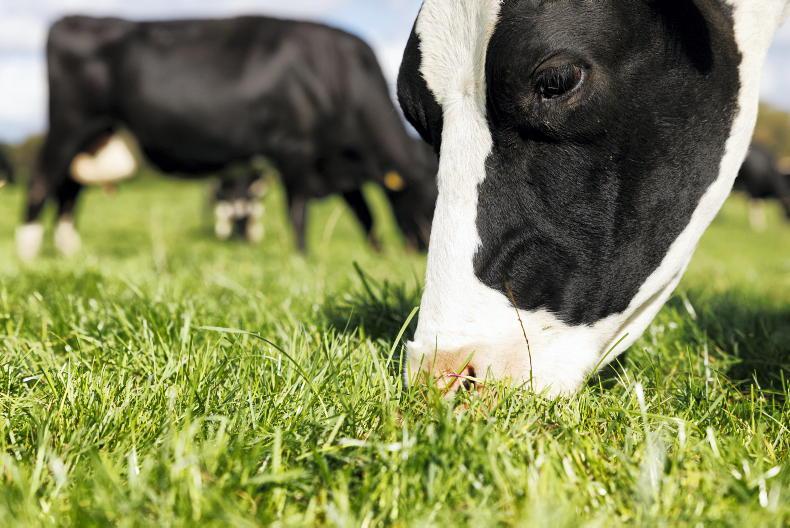The year 2020 will be remembered as one of ups and downs when it comes to grassland management. While the total tonnage of grass grown on most farms won’t be too dissimilar to previous years, it was by no means straightforward.
The grazing year started out wet and then went dry. Bad memories of 2018 came rushing back for many farmers on dry land, as they were facing the prospect of a drought in early June.
For those on heavier land, the incredibly dry April, May and June period was a blessing. Combined with extra help available due to COVID-19, it was a boom time for reseeding, fencing and land drainage. The beautiful summer evenings during May and June were ideal for making silage and hay.
August was a particularly wet month, with Valentia in Kerry recording almost twice its normal rainfall at 220mm
These memories live longer than the miserably wet conditions experienced in February. Many farmers just couldn’t get cows out to graze. It was the wettest February on record for 16 Met Éireann weather stations and more than three times the normal rainfall fell at Gurteen in Co Tipperary.
The autumn also proved wet. August was a particularly wet month, with Valentia in Kerry recording almost twice its normal rainfall at 220mm. While September was quite dry in most places, October and November proved extremely wet, particularly in the heavy soils area of the west and southwest, the result of which was an early winter on many farms.
In terms of cumulative grass growth, figures from PastureBase show that total tonnage of grass grown on farms measuring more than 30 times in the year was 13.4t DM/ha in 2020. These figures are subject to change slightly as more farmers complete closing this winter and opening covers next spring.
Grass courses
The Irish Farmers Journal had over 100 farmers attend grass courses this year, bringing to almost 200 the number of farmers trained in grassland management over the last two years.
There were 10 courses this year and these proceeded every month, either online or in person, depending on Government guidelines. In addition to these 10-day courses over 10 months, a shorter three-day course outlining the basics of grassland management was also completed last spring.
Participants learn the process of recording the grass walk on the computer and the phone
A typical day on the 10-day course includes going through each participant’s current grass situation and finding out the general grass issues on farms at that particular time of year. This is then followed by a grass walk on the host farm, where we go through the grass measuring process, assess grass quality and look at grazing options while in the fields.
Once the grass walk is complete, we come back to the projector and screen and enter the grass walk figures into PastureBase. Everyone can see the figures as they are being uploaded.
Participants learn the process of recording the grass walk on the computer and the phone. From here, the group learns how to generate the grass wedge and understand the figures.
As a group, we look at the decisions that should be made on the farm from the grass walk and grass wedge.
Getting good at the decision-making process is where the real value is in grassland management. Once you understand the figures, decision-making becomes an awful lot easier. Learning how to make good grass decisions is the objective of the Irish Farmers Journal grass courses. In addition to these routine aspects, a specialised topic is also covered each day. These topics include soil fertility, grazing infrastructure, reseeding, clover, silage quality and many more relevant topics.
In addition to the beginners’ courses, we also ran two advanced grassland management courses in 2020. These courses were attended by graduates of the beginners’ course and farmers who were already measuring grass, but wanted to move up a level and improve their skills at budgeting and growing high tonnages of quality grass.
Attendant profile
A wide spectrum of farmers and students with varying levels of existing skills and knowledge attend the grass courses. There is typically a big range in the age profile and level of experience between the participants. This is not an issue, as the course material is aimed at beginners to grass measuring. Information is shared in a friendly uncomplicated way. Participant feedback collected from Macra Skillnet has been universally excellent.
I rarely visit the farm. Everything I need to see I can see it from PastureBase
A good few course participants are farm managers or farm assistants on large farms or on second units. Feedback from farm owners has also been very positive. The course enables them to upskill employees and they immediately see the benefits in terms of farm performance. Farm owners such as Peter Brady are really seeing the benefits of the course.
He said: “We set up a second unit in 2019 and Derek Croal, who featured in the Dairy Day videos, manages the farm. Derek attended the 2019 grass course in Navan and hosted the group himself in 2020. I feel it gave him extra confidence around decision-making.
“I rarely visit the farm. Everything I need to see I can see it from PastureBase. I’d highly recommend farmers and farm managers to attend,” Peter says.
Course focus: Kilkenny advanced

Stephen Connolly delivering a course on grass management on a farm in Offaly.
This group was made up of farmers from all over the southeast. Each participant recorded over 20 grass walks on PastureBase in 2019, so they were well able to measure. This year, they recorded on average 35 grass walks each, with a number of farmers doing over 40 grass walks. At the start of the year, each farmer set targets for grass growth, meal fed and milk solids produced.
The group surpassed all their targets and achieved an average of 14.8t DM/ha of grass grown, 511kg of milk solids sold per cow from an average of 771kg of meal per cow. The group originally set out to feed less than 660kg of meal, but a drought in early summer affected most members of this group so more was fed than planned.
Plans for 2021
We are accepting expressions of interest from farmers wishing to take part in the 2021 grass courses. If you are interested in learning more or would like to enrol or for an employee to enrol, please contact Stephen on 087-669 6490 or sconnolly@
farmersjournal.ie
The year 2020 will be remembered as one of ups and downs when it comes to grassland management. While the total tonnage of grass grown on most farms won’t be too dissimilar to previous years, it was by no means straightforward.
The grazing year started out wet and then went dry. Bad memories of 2018 came rushing back for many farmers on dry land, as they were facing the prospect of a drought in early June.
For those on heavier land, the incredibly dry April, May and June period was a blessing. Combined with extra help available due to COVID-19, it was a boom time for reseeding, fencing and land drainage. The beautiful summer evenings during May and June were ideal for making silage and hay.
August was a particularly wet month, with Valentia in Kerry recording almost twice its normal rainfall at 220mm
These memories live longer than the miserably wet conditions experienced in February. Many farmers just couldn’t get cows out to graze. It was the wettest February on record for 16 Met Éireann weather stations and more than three times the normal rainfall fell at Gurteen in Co Tipperary.
The autumn also proved wet. August was a particularly wet month, with Valentia in Kerry recording almost twice its normal rainfall at 220mm. While September was quite dry in most places, October and November proved extremely wet, particularly in the heavy soils area of the west and southwest, the result of which was an early winter on many farms.
In terms of cumulative grass growth, figures from PastureBase show that total tonnage of grass grown on farms measuring more than 30 times in the year was 13.4t DM/ha in 2020. These figures are subject to change slightly as more farmers complete closing this winter and opening covers next spring.
Grass courses
The Irish Farmers Journal had over 100 farmers attend grass courses this year, bringing to almost 200 the number of farmers trained in grassland management over the last two years.
There were 10 courses this year and these proceeded every month, either online or in person, depending on Government guidelines. In addition to these 10-day courses over 10 months, a shorter three-day course outlining the basics of grassland management was also completed last spring.
Participants learn the process of recording the grass walk on the computer and the phone
A typical day on the 10-day course includes going through each participant’s current grass situation and finding out the general grass issues on farms at that particular time of year. This is then followed by a grass walk on the host farm, where we go through the grass measuring process, assess grass quality and look at grazing options while in the fields.
Once the grass walk is complete, we come back to the projector and screen and enter the grass walk figures into PastureBase. Everyone can see the figures as they are being uploaded.
Participants learn the process of recording the grass walk on the computer and the phone. From here, the group learns how to generate the grass wedge and understand the figures.
As a group, we look at the decisions that should be made on the farm from the grass walk and grass wedge.
Getting good at the decision-making process is where the real value is in grassland management. Once you understand the figures, decision-making becomes an awful lot easier. Learning how to make good grass decisions is the objective of the Irish Farmers Journal grass courses. In addition to these routine aspects, a specialised topic is also covered each day. These topics include soil fertility, grazing infrastructure, reseeding, clover, silage quality and many more relevant topics.
In addition to the beginners’ courses, we also ran two advanced grassland management courses in 2020. These courses were attended by graduates of the beginners’ course and farmers who were already measuring grass, but wanted to move up a level and improve their skills at budgeting and growing high tonnages of quality grass.
Attendant profile
A wide spectrum of farmers and students with varying levels of existing skills and knowledge attend the grass courses. There is typically a big range in the age profile and level of experience between the participants. This is not an issue, as the course material is aimed at beginners to grass measuring. Information is shared in a friendly uncomplicated way. Participant feedback collected from Macra Skillnet has been universally excellent.
I rarely visit the farm. Everything I need to see I can see it from PastureBase
A good few course participants are farm managers or farm assistants on large farms or on second units. Feedback from farm owners has also been very positive. The course enables them to upskill employees and they immediately see the benefits in terms of farm performance. Farm owners such as Peter Brady are really seeing the benefits of the course.
He said: “We set up a second unit in 2019 and Derek Croal, who featured in the Dairy Day videos, manages the farm. Derek attended the 2019 grass course in Navan and hosted the group himself in 2020. I feel it gave him extra confidence around decision-making.
“I rarely visit the farm. Everything I need to see I can see it from PastureBase. I’d highly recommend farmers and farm managers to attend,” Peter says.
Course focus: Kilkenny advanced

Stephen Connolly delivering a course on grass management on a farm in Offaly.
This group was made up of farmers from all over the southeast. Each participant recorded over 20 grass walks on PastureBase in 2019, so they were well able to measure. This year, they recorded on average 35 grass walks each, with a number of farmers doing over 40 grass walks. At the start of the year, each farmer set targets for grass growth, meal fed and milk solids produced.
The group surpassed all their targets and achieved an average of 14.8t DM/ha of grass grown, 511kg of milk solids sold per cow from an average of 771kg of meal per cow. The group originally set out to feed less than 660kg of meal, but a drought in early summer affected most members of this group so more was fed than planned.
Plans for 2021
We are accepting expressions of interest from farmers wishing to take part in the 2021 grass courses. If you are interested in learning more or would like to enrol or for an employee to enrol, please contact Stephen on 087-669 6490 or sconnolly@
farmersjournal.ie










SHARING OPTIONS